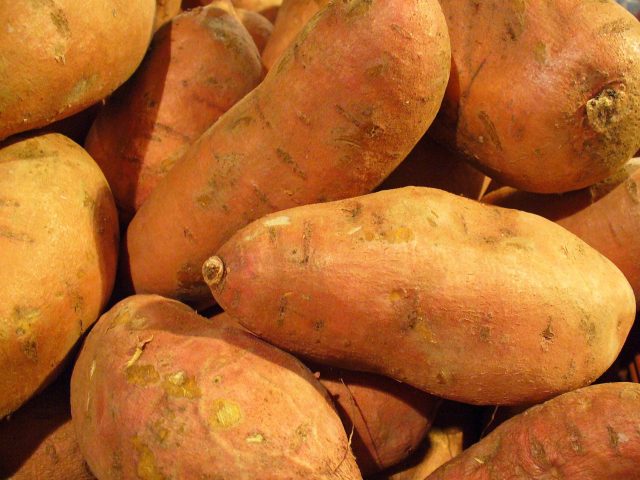MI weekly selection #7

Could Earth be constantly crashing through dark matter?
Scientists are looking to new techniques to search for evidence that the Earth is constantly breaking through walls of dark matter. Researchers are acting on a theory that dark matter, made up of weakly interacting massive particles, are tied up in domain walls, which they liken to boundaries between the matter. So far, no evidence of such a wall has been found due to common outside interference, but researchers remain optimistic.
M. Pospelov, S. Pustelny, M. P. Ledbetter, D. F. Jackson Kimball, W. Gawlik, and D. Budker (2013) Detecting Domain Walls of Axionlike Models Using Terrestrial Experiments Phys. Rev. Lett.110, 021803 DOI: 10.1103/PhysRevLett.110.021803
Are sweet potatoes key to tracking prehistoric human movements?
The key to understanding how prehistoric humans explored the Earth may depend on the genetics of an unsuspecting crop: the sweet potato. That’s according to a study published in the Proceedings of the National Academy of Sciences, which presents evidence of a link between prehistoric Polynesia and South America based on the analysis of preserved sweet potato samples. Analysis indicated major differences between crop varieties in the west vs. the east, supporting the “tripartite hypothesis” — that the sweet potato was introduced three times into the region, starting with prehistoric traces.
Caroline Roulliera, Laure Benoitb, Doyle B. McKey, and Vincent Lebota (2013) Historical collections reveal patterns of diffusion of sweet potato in Oceania obscured by modern plant movements and recombination PNAS DOI: 10.1073/pnas.1211049110
Does an efficient brain also lead to more self-control?
Self-control may be tied to efficiently functioning brains. Researchers had taken a deeper look at participants in a “marshmallow test,” and found that those who used the most efficient ways to accomplish a task tended to exert more self-control. However, the correlational findings do not show whether efficient brain function causes self-control nor do they explain whether nature or nurture influences self-control.
Marc G. Berman, Grigori Yourganov, Mary K. Askren, Ozlem Ayduk, B. J. Casey, Ian H. Gotlib, Ethan Kross, Anthony R. McIntosh, Stephen Strother, Nicole L. Wilson, Vivian Zayas, Walter Mischel, Yuichi Shoda, John Jonides (2013) Nat. Commun. 4 : 1373 DOI:10.1038/ncomms2374
Human Proteome Project Update
Scientists working on the Chromosome-centric Human Proteome Project report steady progress in the effort to map all the proteins produced by genes on human chromosomes. Reports in the Journal of Proteome Research include the identification of 54 proteins on Chromosome 4 associated with cancer; a proteome map of Chromosome 8, which has a high mutation rate and could be related to tumor genesis; and new data integration and analysis software for researchers working on the project.
Journal of Proteome Research January 4, 2013Volume 12, Issue 1Pages 1-546
A solution to the invariant space problem for Hilbert spaces
At the congress of la Real Sociedad Matemática Española yesterday, Eva Gallardo and Carl Cowen presented an affirmative answer to the invariant subspace problem on separable Hilbert spaces. While it isn’t a Millennium Prize problem, it’s one of the big open problems in maths.